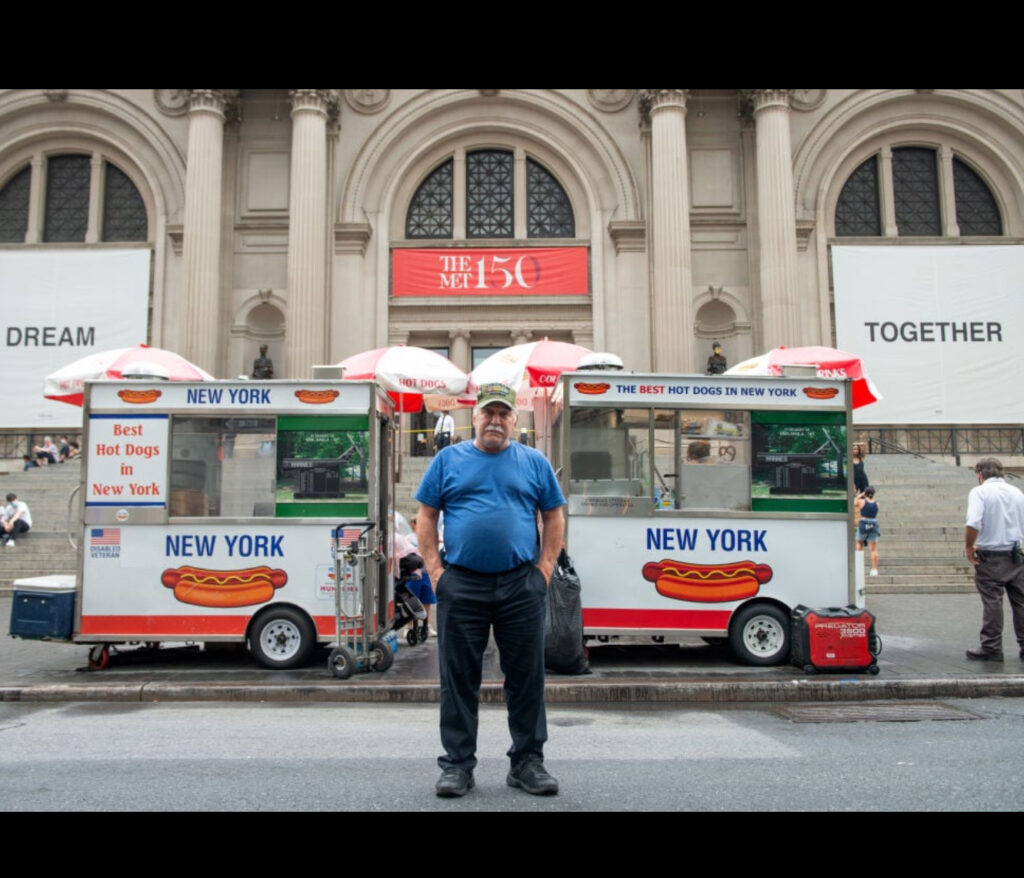New York City is a place where stories unfold on every corner. Amidst the hustle and bustle of Manhattan, where skyscrapers tower over city streets, there exists a modest pushcart stationed near the steps of the Metropolitan Museum of Art. At its helm is Dan Rossi, a man who has come to symbolize resilience, determination, and the grit of New York’s entrepreneurial spirit. Known as NYC’s “Hot Dog King,” Rossi’s story is more than just about selling hot dogs; it’s a tale of perseverance, community, and the fight to preserve one of the city’s most iconic traditions.
The Journey to Becoming the “Hot Dog King”
Dan Rossi wasn’t always known as the Hot Dog King. Born and raised in the Bronx, Rossi grew up in an Italian-American family where community values and hard work were integral to daily life. His journey into street vending began over 40 years ago. With little more than a dream and a drive to succeed, he entered the competitive world of New York City’s pushcart vending scene.
In his early days, Rossi managed an impressive fleet of 499 carts scattered throughout the city, earning him the nickname “Pushcart King.” At the height of his success, he was not just a businessman but a pioneer, contributing to the vibrancy of New York City’s streets. However, as with any entrepreneurial journey, Rossi faced significant challenges. Legal disputes, rising operating costs, and changing city regulations forced him to downsize his empire. Despite these setbacks, Rossi remained steadfast in his commitment to the craft, ultimately focusing on a single cart stationed outside the Met.
A Day in the Life of Dan Rossi
Spending a day with Dan Rossi offers a glimpse into the life of a man who has truly mastered his craft. Operating his cart 364 days a year—taking a break only for the Met Gala—Rossi’s work ethic is unmatched. His day begins long before tourists and locals line up for a taste of his iconic hot dogs. Here’s a breakdown of what a typical day looks like for the Hot Dog King:
Early Morning Preparations
Rossi’s mornings begin early. Before the city fully awakens, he ensures his cart is clean, stocked, and ready for the day. Unlike many vendors who purchase pre-made hot dogs in bulk, Rossi prides himself on serving high-quality food. He carefully selects his ingredients, ensuring that his customers get a premium experience.
Securing His Spot
The location of Rossi’s cart, just steps from the Metropolitan Museum of Art, is prime real estate for a vendor. However, securing this spot is no small feat. Rossi goes to great lengths to maintain his position, often sleeping in his van nearby to prevent anyone from taking it. This level of dedication is a testament to his perseverance and understanding of the competitive nature of the street vending business.
Serving the People
By mid-morning, the aroma of sizzling hot dogs begins to waft through the air, drawing a steady stream of customers. Tourists fresh from exploring Central Park, art enthusiasts leaving the Met, and locals grabbing a quick bite all find their way to Rossi’s cart. But what keeps them coming back isn’t just the food—it’s Rossi himself. Known for his quick wit and warm demeanor, he engages with every customer, turning each transaction into a personal experience.
Challenges in the Street Vending Industry
While Rossi’s dedication is inspiring, it hasn’t come without its share of challenges. New York City’s street vending industry is heavily regulated, and vendors often face bureaucratic hurdles, competition, and public scrutiny. For Rossi, these challenges have included battles over permits, disputes with city officials, and maintaining compliance with ever-changing health codes.
Permit Wars
The limited availability of vending permits in NYC has created a black market where permits are sold for exorbitant prices. Rossi’s fight to keep his permit has been emblematic of the struggles faced by vendors citywide. He has been vocal about the need for fairer regulations, advocating for reforms that would allow vendors to operate without fear of losing their livelihoods.
Financial Pressures
Operating a hot dog cart in Manhattan isn’t cheap. Between permit fees, food costs, and maintenance expenses, the profit margins can be slim. Yet, Rossi has managed to sustain his business through strategic planning and unwavering determination.
The Pandemic’s Impression
The COVID-19 pandemic brought new challenges to the street vending industry. With fewer tourists and locals on the streets, many vendors struggled to stay afloat. Rossi’s resilience during this time earned him even more respect from his community, as he continued to serve hot dogs despite the reduced foot traffic.
Community Support and Advocacy
Rossi’s story has resonated with New Yorkers from all walks of life. Over the years, he has built a loyal following of customers who not only enjoy his hot dogs but also admire his character. When Rossi faced potential eviction from his spot outside the Met due to city regulations, supporters rallied behind him. A petition advocating for his right to stay garnered thousands of signatures, underscoring the deep connection between Rossi and the community he serves.
Cultural Significance of Street Vending in NYC
Street vending is more than just a business in New York City—it’s a cultural institution. Vendors like Rossi contribute to the city’s vibrancy, offering affordable food options and creating spaces where people from different backgrounds can connect. Rossi’s cart, in particular, has become a symbol of resilience and tradition, representing the enduring spirit of the city.
The Hot Dog: An NYC Icon
Hot dogs have long been associated with New York City’s street food culture. Rossi’s commitment to serving high-quality hot dogs elevates this humble food item, turning it into a must-try experience for visitors and locals alike.
Bridging Communities
Rossi’s cart attracts a diverse clientele, from international tourists to lifelong New Yorkers. His ability to connect with people from all walks of life has made his cart a microcosm of the city itself—a place where different cultures and stories intersect.
Preserving Tradition
In an era where fast food chains dominate, Rossi’s cart stands as a reminder of the authenticity and charm of street vending. By maintaining his cart’s presence outside the Met, he helps preserve a piece of New York City’s history.
Reflections on Resilience and Legacy
Spending a day with Dan Rossi offers more than just a glimpse into the life of a street vendor—it’s a lesson in resilience and the importance of staying true to one’s values. Rossi’s journey from managing a fleet of pushcarts to defending a single permit is a testament to his adaptability and determination. His story is not just about selling hot dogs; it’s about building a legacy that inspires others to persevere in the face of adversity.
Looking Ahead
As Rossi continues to operate his cart, his story serves as a rallying cry for fair treatment of street vendors and recognition of their contributions to the city. By advocating for reform and supporting his fellow vendors, Rossi is helping to pave the way for a more equitable future in the industry.
Dan Rossi, NYC’s Hot Dog King, is more than just a vendor—he’s a symbol of the city’s resilience and entrepreneurial spirit. His story encapsulates the challenges and triumphs of street vending in New York, offering a window into the lives of those who help shape the city’s unique culture. Spending a day with Rossi is not just about enjoying a delicious hot dog; it’s about experiencing the heart and soul of New York City, one bite at a time.
No comments yet.








